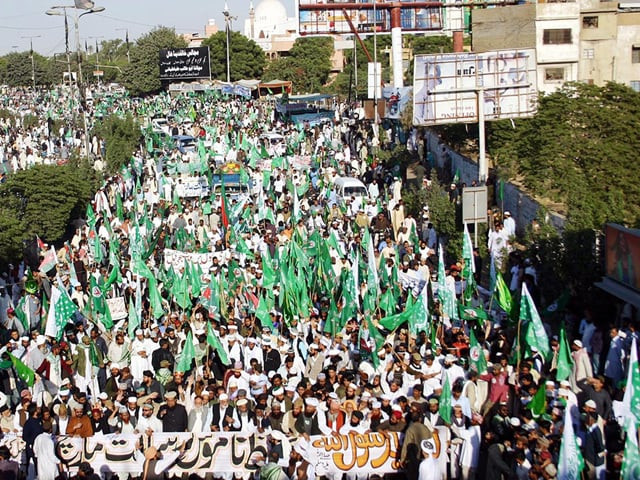Women Action Forum: Awareness on blasphemy laws takes priority
WAF is looking at support from different stakeholders of society to lead the debate on the blasphemy laws.

In a meeting organised at the Aurat Foundation’s office in Karachi, WAF’s Nuzhat Kidvai, Mahnaz Rahman, Uzma Noorani and Kausar Saeed Khan addressed journalists and discussed the role that could be played by the media and civil society in the aftermath of Punjab Governor Salmaan Taseer’s assassination.
Khan said the Women’s Action Forum (WAF) had been planning to move a petition about the blasphemy law several months ago and had obtained advice from scholars as well as lawyers. A senior lawyer had, however, advised them that while a strong case could be made about the law, the mood in the country may not allow for it, and a judgment may come from the courts that would be against the plaintiffs.
Hence the WAF’s work in this regard had been put on hold because of the work they were doing in the flood-affected areas, said Khan. She added, however, that it was now important to raise the issue again in light of Aasia Bibi’s case and Taseer’s assassination. “We may work on women’s affairs,” Khan said. “But any injustice in society is also injustice against women and all of us are morally bound to address the ills in our society.”
The organisation showed a presentation on the evolution of the blasphemy law and a moving short film about the misuse of the law, which included stories of people wrongly accused. Quotes from religious scholars and historians were also shown at the event.
The blasphemy law, which was introduced in the Penal Code by the British in 1860, was added on to the constitution by General Ziaul Haq’s government in the 1980s. The presentation, featuring research by Mansoor Reza, highlighted the shift of the law from protecting disrespect to all religious symbols and sentiments to becoming specific in terms of Islam. The law also added sentences of life imprisonment and/or death.
Reza’s research, which also used data from a report in Herald as well as data by the Human Rights Commission of Pakistan, showed that 361 cases of blasphemy have been registered between 1986 and 2007, a majority of which were in the Punjab province. It also highlighted that sections 295-b and 295-C have been invoked in 144 and 188 cases respectively.
The researcher recommended that the mobs and inciters that accuse people of blasphemy should be brought to justice as well as police officials who arrest people accused without any investigation.
As the participants were discussing potential steps to highlight the misuse and religious basis of the blasphemy law, a short distance away at Punjab Chowrangi, the Tahafuz Namoos-e-Risalat march on Sunday was being advertised by two men holding banners and a loudspeaker blaring slogans.
Published in The Express Tribune, January 9th, 2011.



















COMMENTS
Comments are moderated and generally will be posted if they are on-topic and not abusive.
For more information, please see our Comments FAQ